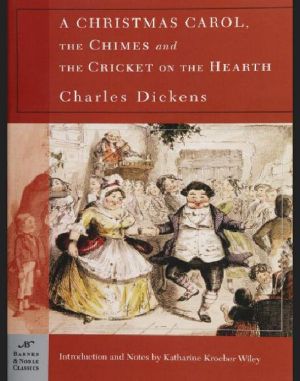A Christmas Carol/The Chimes/The Cricket on the Hearth (B & N Classics)

- Authors
- Dickens, Charles
- Publisher
- Barnes & Noble
- Tags
- fantasy , classics
- ISBN
- 9781593080334
- Date
- 1970-01-02T06:00:00+00:00
- Size
- 4.50 MB
- Lang
- en
Excerpt. © Reprinted by permission. All rights reserved.From Katherine Kroeber Wiley's Introduction to *A Christmas Carol, The Chimes, and The Cricket on the Hearth*
"Marley was dead, to begin with. There is no doubt whatever about that." Thus begins Dickens's most famous and yet poorly understood work. It does not start with a description of Scrooge as a miser, but with death. All of Dickens's Christmas books revolve around death. Americans and Europeans of the twenty-first century are fairly sheltered from death—it seldom happens in our homes, for instance; we can bring people back from the brink of death in ways inconceivable to Victorians; we have powerful drugs to ease the pain of, say, cancer, and so forth. In Dickens's day, one could die from an infected cut; today we simply slap on some antibiotic ointment and feel confident we'll be all right. Death was very present and very haunting to the Victorians. Children and women were particularly vulnerable; we may find some of the sentiment over Tiny Tim cloying, but through him Dickens strove to present the special poignancy of the deaths of children.
Having started with Marley's death, and Scrooge's full knowledge and experience of it, Dickens goes on to say that Scrooge never painted over Marley's name on the warehouse door: "Sometimes people new to the business called Scrooge Scrooge, and sometimes Marley, but he answered to both names. It was all the same to him." Dickens then presents Scrooge's miserliness, but he first presents Scrooge as so far astray he no longer even possesses a true sense of self. Scrooge is not a person, even to himself, but a business. It is that lack of self that leads to his miserliness and his alienation from humanity.
The theme of blindness or deliberate obtuseness, important in The Cricket on the Hearth and The Chimes, appears quite early in A Christmas Carol. Scrooge's nephew, in bursting in upon him, precipitates Scrooge's well-known contemptuous remarks upon Christmas. Upon the nephew's departure two "portly gentlemen" approach; they are setting up a fund to "buy the Poor some meat and drink, and means of warmth." Scrooge inquires of them as to the state of the prisons, workhouses, the treadmill, and the Poor Law. Prisons and workhouses alike were dreadful places, dank and dark, in which families could not live together but were divided up by gender and age. The treadmills, invented in 1818 originally were actual engines, designed to power mills that ground corn and the like; various laws dealing with the poor established the presence of treadmills in the workhouses. By Dickens's time, however, the treadmills were merely objects in which the poor could be simultaneously contained and worked into exhaustion; no product resulted but the further degradation of the workers. The Poor Law of 1834 divided the poor into the "deserving" and the "undeserving." The "help" provided to the deserving was scant indeed, more theory than fact, and it was almost impossible to prove one was deserving. The decision truly rested with people who sat on the boards of directors of workhouses or other persons living in comfort that was derived from profits expanded, in part, by paying out only very little to help those in need. Whatever its intention, the Poor Law provided a mere facade of welfare; in fact, it was a series of impossible obstacles.
The portly gentlemen point out to Scrooge that prisons and workhouses "scarcely furnish Christian cheer of mind or body"—Dickens presumes that Christianity declares that all people are entitled to cheer of mind, not merely a life of subsistence-and that "many can't go there; and many would rather die."
"If they would rather die," said Scrooge, "they had better do it, and decrease the surplus population. Besides—excuse me—I don't know that."
"But you might know it," observed the gentleman.
"It's not my business," Scrooge returned.
There it is, that claim to ignorance—only in this instance the illusion is punctured straight away by the two gentlemen who have made it their business to look about them and perceive the suffering of the world. Scrooge can only not know it by deliberate intent.